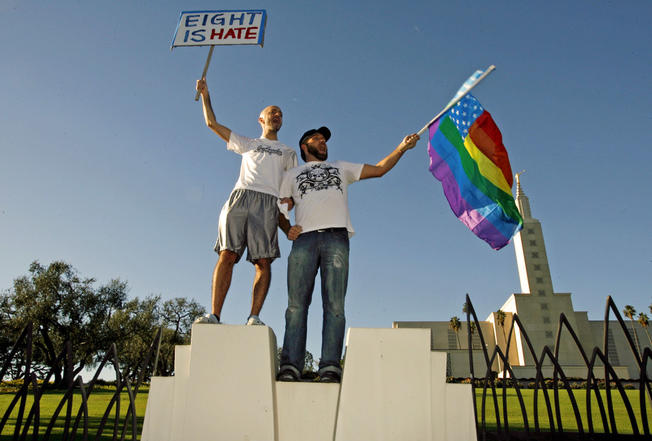I don’t enjoy telling my coming out story. It doesn’t make me feel brave or justified. In fact, I don’t think of it as my story at all, because I didn’t get to tell it the way I would have wanted to. And since there were so many others who were a part of this story, I think it should be their story, not mine. For example, I’ve heard parents of LGBTQ people tell their stories, often confessing their limitations when their children came out to them, and looking back, describing the shame they now feel over how they responded to their LGBTQ child: the father who disowned his son, the mother who screamed at her daughter to leave and not come back—these are the parents’ story, they own that.
I guess what I’m saying is that many of our coming out stories are just as much—if not more so—someone else’s story than they are our own. So, if the Mormon church actually told their coming out story of their beloved sister, Debbra (that’s me) it would go something like this:
By the late 1980s Debbra did not continue on the path designed by our church’s male leaders back in the 1830s (you see, our church had a long history which excluded homosexual members.) From the very beginning, homosexuals were among us and with us, writing hymns, teaching primary, blessing the sacrament, serving missions and more. It was always a point of pride among Mormons to be different—to follow a different social and moral code. But when it came to homosexuals, even though we knew what it is to be persecuted, we subscribed to American sentiments of the time and we grew more hostile against homosexuals. We certainly did nothing to protect them. We did not protect them, or keep them or welcome them in our houses of worship. We counseled families to shun them, and one of our longest serving modern day prophets suggested they should want to die rather than live” unclean.”
When our sister in the Lord, Debbra, came to understand that she could not possibly commit to our church’s plan of salvation (which excludes homosexuals) we did not offer her any alternative or even kindness and understanding. Instead, we actively renounced the “lifestyle” and began funding expensive political campaigns against equal rights and marriage equality. We had a lot of people on our side, and although we wouldn’t claim them as friends, it was helpful in generating fear among voters who believed that they and their families were threatened by homosexuals. We could see how this broke Debbra’s heart, made her feel abandoned by her faith and family, and yet, we did it anyway in the name of Christ, who never said anything about homosexuals.

Even though we no longer promote the message that homosexuals are a threat to the family, we still do not allow them into our temples, and there is no place for them in the plan of salvation. In the afterlife, they will be cured and be given another chance to follow the plan. We regret that Debbra will not enter the kingdom of glory where we, who are fortunate enough be heterosexual, will live in peace in the presence of the Lord forever. But clearly, the choice was Debbra’s.
This is an example of one of thousands of The Church of Jesus Christ and Latter Day Saints’ coming out stories of the trauma that has led (and continues to lead) to great suffering among LGBTQ members and former members, and the disproportionate number who take their own lives. It has taken me decades to reconcile most of my fear and anger. I lost touch with most of my peers and teachers. I have made an effort among my family who are still active members, although we have not been close for years.
I hold in my heart many fond memories as a youth in the church, and as many horrors. It has been wave after wave of realizations that have landed me, finally, in a safe place where I can reflect and learn, and I know there is more—this “coming out” story continues. Even recently I was doing research for a book when I realized that the very origin of the Mormon religion was sparked by deep anguish. And I saw a parallel between the earnest yearning of a young Joseph Smith and LGBTQ LDS members. Both have anguished to know the truth and where to go to be in its presence with others. So in this way, Joseph’s prayer continues among the LGBTQ community. These are people who have asked in faith, nothing wavering, for wisdom. I am among them, and I will keep asking. But I will not be asking for a way into the church. I will be asking for healing for this community, and for intelligence to prevail (is it not the glory of God?)
My coming out story as told by me evolves. It is not a tragic story when it is my own story to tell. The sad parts are simply not mine.
We want to hear your story–here’s how to share it with us!
Each Sunday we feature a new Coming Out Story on the Latter Gay Stories blog. Coming out is an important process that is different for everyone; some experiences are difficult; while others are heart-warming and inspiring. Coming out is rarely easy–but your story will help others draw inspiration from your own experience. We rely on weekly submissions to keep the Coming Out Stories alive and invite you to share your story now.


